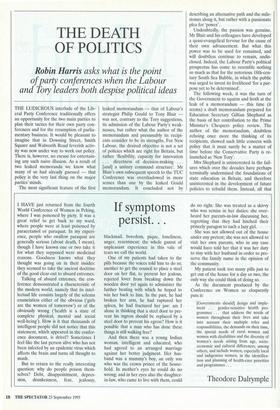If symptoms
persist.. .
I HAVE just returned from the fourth World Conference of Women in Peking, where I was poisoned by piety. It was a great relief to get back to my ward, where people were at least poisoned by paracetamol or paraquat. In my experi- ence, people who swallow paraquat are generally serious (about death, I mean), though I have known one or two take it for what they supposed were medicinal reasons. Goodness knows what they thought was going on in their insides: they seemed to take the ancient doctrine of the good clear-out to absurd extremes.
Talking of absurd extremes, the con- ference demonstrated a characteristic of the modern world, namely that its intel- lectual life consists largely of the solemn enunciation either of the obvious (`girls are the women of tomorrow') or of the obviously wrong (`health is a state of complete physical, mental and social well-being'). How is it that thousands of intelligent people did not notice that this statement, which appeared in the confer- ence document, is drivel? Sometimes I feel like the last person alive who has not been infected by an epidemic virus which affects the brain and turns all thought to mush.
But to return to the really interesting question: why do people poison them- selves? Debt, disappointment, depres- sion, drunkenness, fear, jealousy, blackmail, boredom, pique, loneliness, anger, resentment: the whole gamut of unpleasant experience in this vale of tears we call the world.
One of my patients had taken to the pills because the voices told him to do so; another to get the council to place a steel door on her flat, to prevent her jealous, rejected lover from breaking down the wooden door yet again to administer the further beating with which he hoped to win her back to him. In the past, he had broken her arm, he had ruptured her spleen, he had fractured her jaw: am I alone in thinking that a steel door to pre- vent his ingress should be replaced by a steel door to prevent his egress? How is it possible that a man who has done these things is still walking free?
And then there was a young Indian woman, intelligent and educated, who had agreed to an arranged marriage against her better judgment. Her hus- band was a mummy's boy, an only son who was the crown prince of the house- hold. In mother's eyes he could do no wrong; and in her eyes also the daughter- in-law, who came to live with them, could do no right. She was treated as a skivvy who was remiss in her duties: she over- heard her parents-in-law discussing her, regretting that they had hitched their princely paragon to such a lazy girl.
She was not allowed out of the house under any pretext; she was not allowed to visit her own parents, who in any case would have told her that it was her duty to stay with her husband in order to pre- serve the family name in the opinion of the community.
My patient took too many pills just to get out of the house for a day or two, the only way she could think of doing so.
As the document produced by the Conference on Women so eloquently puts it:
[Governments should] design and imple- ment . . . gender-sensitive health pro- grammes . . . that address the needs of women throughout their lives and take into account their multiple roles and responsibilities, the demands on their time, the special needs of rural women and women with disabilities and the diversity of women's needs arising from age, socio- economic and cultural differences, among others, and include women, especially local and indigenous women, in the identifica- tion and planning of health-care priorities and programmes . . .
Theodore Dalrymple


































































 Previous page
Previous page